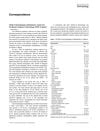 2 citations,
September 2022 in “Cureus”
2 citations,
September 2022 in “Cureus” Almost half of COVID-19 patients in Makkah, Saudi Arabia experienced increased hair loss, especially women and those with chronic diseases.
6 citations,
December 2022 in “Journal of Infection” The ACE1 gene variant doesn't affect long-COVID symptoms.
8 citations,
June 2021 in “Annals of internal medicine” Experts recommend a team-based approach to treat patients with long-lasting COVID-19 symptoms and emphasize the need for ongoing research.
 November 2021 in “Journal of the European Academy of Dermatology and Venereology”
November 2021 in “Journal of the European Academy of Dermatology and Venereology” Skin and mucosal issues can occur after COVID-19 in adults and children.
 2 citations,
September 2021
2 citations,
September 2021 The COVID-19 pandemic increased the use of teledermatology to treat skin conditions in low-income areas, despite challenges like poor photo quality.
 January 2021 in “Clinical case studies and reports”
January 2021 in “Clinical case studies and reports” A man had nail and hair changes months after severe Covid-19, showing long-term effects.
 November 2022 in “Journal of Investigative Dermatology”
November 2022 in “Journal of Investigative Dermatology” Low oxygen levels affect the behavior of certain proteins in human skin cells.

Interest in COVID-19 hair loss increased during COVID-19 surges, especially in higher-income countries.
 2 citations,
August 2020 in “Journal of The American Academy of Dermatology”
2 citations,
August 2020 in “Journal of The American Academy of Dermatology” High incidence of hair loss found in COVID-19 patients, but no severity correlation established.

Many severe COVID-19 patients experienced temporary hair loss, but most regrew hair within six months.
 1 citations,
August 2022 in “JAMMI”
1 citations,
August 2022 in “JAMMI” Some people still have COVID-19 symptoms after 90 days, especially older patients and those with severe initial symptoms, but most return to normal.
 March 2022 in “medRxiv (Cold Spring Harbor Laboratory)”
March 2022 in “medRxiv (Cold Spring Harbor Laboratory)” People with blood group O may have a higher risk of developing post-COVID-19 syndrome.
 April 2021 in “European journal of medical and health sciences”
April 2021 in “European journal of medical and health sciences” The pandemic stress may have increased alopecia cases in Bangladesh.
 December 2023 in “Journal of ethnopharmacology”
December 2023 in “Journal of ethnopharmacology” Tribuloside can increase skin pigmentation by enhancing melanin production and distribution.
 3 citations,
January 2023 in “Skin appendage disorders”
3 citations,
January 2023 in “Skin appendage disorders” Some people with a history of autoimmune hair loss experienced worsening symptoms after COVID-19 vaccination.

COVID-19 infection is highly related to increased hair loss, especially in women.
 December 2021 in “The Sri Lanka Journal of Dermatology”
December 2021 in “The Sri Lanka Journal of Dermatology” COVID-19 can cause various skin issues, including rashes and lesions.
 15 citations,
January 2022 in “Journal of Infection”
15 citations,
January 2022 in “Journal of Infection” COVID-19 vaccines are safe and highly effective for children, with inactivated vaccines being slightly better.

Antiandrogens might help prevent or treat COVID-19 by blocking the virus's entry into cells.
 2 citations,
March 2022 in “PubMed”
2 citations,
March 2022 in “PubMed” Most skin reactions to COVID-19 vaccines in India were mild and not a reason to avoid vaccination.
 2 citations,
April 2021 in “International Journal of Dermatology”
2 citations,
April 2021 in “International Journal of Dermatology” COVID-19 can cause skin issues like hives, rashes, and chickenpox-like eruptions, with women aged 31-40 being the most affected.
 2 citations,
January 2023 in “Plants”
2 citations,
January 2023 in “Plants” Plant bioactive compounds are important for health and can help prevent various diseases.
 January 2023 in “Al-Azhar International Medical Journal /Al-Azhar International Medical Journal”
January 2023 in “Al-Azhar International Medical Journal /Al-Azhar International Medical Journal” Hair loss is not clearly linked to COVID-19 vaccination in Egyptians.
 December 2023 in “Y Dược học”
December 2023 in “Y Dược học” Older adults in Vietnam often experience hair loss after COVID-19, especially women, singles, and those hospitalized.
 18 citations,
April 2021 in “Experimental Dermatology”
18 citations,
April 2021 in “Experimental Dermatology” COVID-19 may cause hair loss and scalp pain due to inflammation and changes in hair follicle receptors, but these symptoms typically resolve in 2 to 4 months.
October 2021 in “Journal of Investigative Dermatology” No significant link between male pattern baldness and severe Covid-19, but some shared biological pathways exist.
 3 citations,
June 2022 in “Journal of The American Academy of Dermatology”
3 citations,
June 2022 in “Journal of The American Academy of Dermatology” During the COVID-19 pandemic, more people were diagnosed with stress-related skin conditions like acne and temporary hair loss.
91 citations,
July 2020 in “JAMA Dermatology” Minoxidil can improve hair growth in some patients with woolly hair due to LIPH variants, with varying responses and mild side effects.
 5 citations,
May 2020 in “Dermatologic Therapy”
5 citations,
May 2020 in “Dermatologic Therapy” 5-alpha reductase inhibitors might worsen lung recovery in COVID-19 patients, suggesting a pause in their use.

























